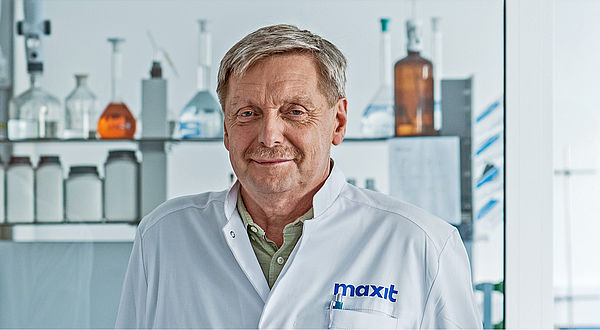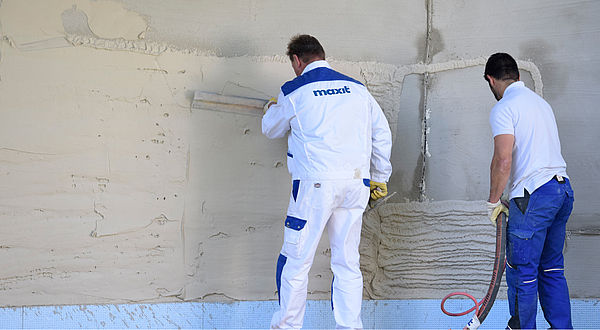Researchers behind "maxit ecosphere" spray insulation in "circle of the best" for Deutscher Zukunftspreis 2020
maxit head of research Friedbert Scharfe and his partners entered the race for the Deutscher Zukunftspreis 2020 for the development of the mineral spray insulation "ecosphere". Although it was not quite enough to win the coveted trophy in the end, the nomination alone is a great honour: an application for the prize is excluded, and only those who have been proposed by an expert institution and selected by the prize jury are nominated. At the official award ceremony in Berlin by Federal President Frank-Walter Steinmeier on 25 November, the team behind the innovative insulation material was therefore grateful and proud.
Germany is still lagging far behind the target for renovation. Yet poorly insulated houses are considered major "climate sinners" even compared to areas such as transport or agriculture. With the mineral spray insulation "ecosphere", building materials manufacturer maxit (Azendorf) presented its idea for solving this problem as early as 2019 at the leading trade fair "BAU": the mortar mass, in which tiny hollow glass spheres act as a lightweight aggregate, is quick and easy to process, sustainable and recyclable. The potential of this new building material technology has now been recognised beyond the construction industry: maxit development manager Friedbert Scharfe and his two research partners Prof. Dr.-Ing. Thorsten Gerdes (University of Bayreuth) and Dr. rer. nat. Klaus Hintzer (Dyneon / 3M) can count themselves among the "circle of the best" in the race for the Deutscher Zukunftspreis 2020. The Federal President himself presents the prestigious award, which stands for outstanding technology and innovation "made in Germany" and has been awarded annually since 1997. "Even if we didn't take home the trophy in the end, it is still a great honour to have been nominated at all. The fact that I was able to meet the Federal President in the context of my research work for maxit is award enough for me," says Scharfe happily.
Interdisciplinary research
On the way to the mass product, Friedbert Scharfe and his research partners first had to overcome several challenges: In order to improve the ecobalance of ecosphere, for example, plaster and mortar specialist maxit developed a special binder formulation that is characterised by a low CO2 footprint. At the same time, it meets the highest requirements in terms of insulation effect, mechanical properties and long-term stability. Another challenge was the search for suitable "glass bubbles": the larger the bubbles, the greater their insulating performance, but also the risk of glass breakage during processing. Finally, the manufacturer 3M was able to develop bubbles with an optimal property profile, which insulate efficiently, survive the processing process almost undamaged and are not destroyed in the alkaline environment of the binder matrix.
From science to practice
Part of the university research work was to optimise the composition of the building material and its processing properties: Unlike insulation materials in board form, ecosphere is not doweled or drilled into the wall, but is sprayed on using a plastering machine. "With ecosphere, we wanted to create an insulating material that is easy and quick to process, and at the same time combines properties that were previously difficult to combine," explains Scharfe. The nomination for the Deutscher Zukunftspreis shows that the team has achieved its goal: In the national performance comparison, outstanding technical, engineering or scientific innovations as well as those from the IT sector are honoured. The prize is offered and awarded by the Federal President himself. "This is of course something special and makes us very proud. Nevertheless, it is important to emphasise that our invention is not an abstract marvel, but a field-tested insulation material for environmentally conscious building," says Scharfe. "We therefore feel the nomination is a great honour for our research, but also a sign of sustainable climate protection in practice."
The ecosphere insulation is manufactured and distributed by maxit. Depending on the federal state - and prospectively also internationally - marketing is also the responsibility of the joint venture partner Saint-Gobain Weber (Düsseldorf). Since the official market launch of ecosphere at the beginning of 2019, around 30,000 square metres have been insulated with the new technology. According to the manufacturer, a market share of approximately four million square metres per year is targeted and realistic in the medium term.
Background
At the world's leading trade fair "BAU 2019" in Munich, maxit presented its new "ecosphere" insulation technology to the trade public for the first time. This is a purely mineral and particularly resource-saving building material whose insulating effect is based on microscopically small, partially vacuumed hollow glass spheres. These can be produced from various types of sand and thus counteract the global shortage of building sand. The non-combustible (A1) mortar-based insulating material can be easily applied by plastering machine to any substrate - inside or outside. The material can be sprayed directly from the building material silo and is therefore not only completely jointless, but also easy to work with. With a thermal conductivity value of 0.04 W/(mK) in the dry mass, ecosphere has since been convincing as an ecological and affordable alternative to conventional insulation materials.
For further information, please contact:
maxit Group |
Franken Maxit Mauermörtel GmbH & Co.
Azendorf 63
D-95359 Kasendorf
www.maxit.de
www.maxit-ecosphere.de
Coordination and press contact:
Reinhard Tyrok
Head of Marketing
Phone: +49(0)9220 18185
Mobile: +49(0)173 5760 325
Email: reinhard.tyrok@maxit.de
Spokesman of the research team:
Friedbert Scharfe
Head of R & D
Phone: +49(0)9220 18135
Mobile: +49(0)173 5760 207
Email: friedbert.scharfe@maxit.de
3M Deutschland GmbH
Carl-Schurz-Str. 1
D-41453 Neuss
Phone: +49(0)2131 14 - 0
www.3M.de
Email: innovation.de@mmm.com
Press contact 3M:
Sabine Karsch
Head of Communication and
Public Relations Central Europe
Mobile: +49(0)0170 7233376
Email: skarsch@mmm.com
Scientific contact person 3M:
Dr. rer.nat. Klaus Hintzer
Corporate Scientist
Industrieparkstr. 1
D-84508 Burgkirchen
Phone: +49(0)8679-74666
Email: khintzer@mmm.com
University of Bayreuth
Universitätsstraße 30
D-95447 Bayreuth
www.uni-bayreuth.de
www.uni-bayreuth.de/deutscher-zukunftspreis
Coordination and press contact:
Anja-Maria Meister
Press spokeswoman
Phone: +49(0)921 55 5300
Mobile: +49(0)151 12133220
Email: anja.meister@uni-bayreuth.de
Scientific contact person:
Prof. Dr.-Ing. Thorsten Gerdes
Head of Keylab Glass Technology
Prof.-Rüdiger-Bormann-Str. 1
D-95447 Bayreuth
Phone: +49(0)921 55 6504
Email: thorsten.gerdes@uni-bayreuth.de

